
Sign Up
Want to receive a newsletter to learn more about KuneKune pigs and other educational information? Sign up to have them delivered right to your inbox.
We look forwarded to sending you some great info.
About KuneKunes: KuneKune Pig Care
Hey there! Interested in learning about KuneKunes and why KuneKune Education is crucial for your success as a breeder? You've come to the right place! We'll cover everything from recommended water dishes, fencing, housing, estimating the weight of your KuneKune Pigs, size comparison, vaccinations, deworming, and even hoof trimming. This page has all the general care information you need to know about KuneKune pig care.
Just click below to be taken directly to the area you're interested in. Happy learning!
KuneKune Educational Center - KuneKune Pigs General Care and FAQ's
Topics on this page. Click to be directed to that area of the web page.
KuneKune Education is Key to learn how to care for your KuneKunes.
There is so much to learn about KuneKunes and we are dedicated to providing knowledge for all breeders to be successful. Above are links to items on this page and below are some additional resources to help you. Don't forget to check on the KuneKune Library, KuneKune Bookstore, and the Blog which is just bursting with knowledge and educational information.
What are KuneKune Pigs?
Learn more about the KuneKune size, KuneKune Size Comparison
In this guide, we'll explore the KuneKune size and uncover everything you need to know about the different breeds. Whether you're a seasoned pig farmer or a beginner, this guide will provide you with valuable insights to help you make informed decisions and ensure the success of your pig-rearing venture.
Shots and Deworming
When Kathy Petersen first started giving shots, it took so long, and it was difficult to get on bigger pigs. She researched and researched and finally found a miracle among livestock breeders to use...a slap shot. As Kathy shared this with breeders she was mentoring and many friends, this became the norm for most breeders. Please note that you should always check with a licensed veterinarian before starting any vaccination or deworming protocol. I can also tell you what I used for 10 years. Watch the video below to see just how easy it is to give shots with a slap shot. The video was done by Rushbury Pig, and Sam Jones in the UK for the British KuneKune Pig Society.
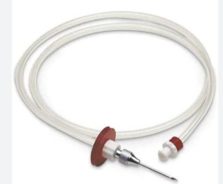
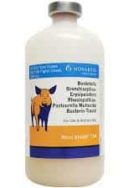
You can order Rhini Shield TX 4 from Valley Vet
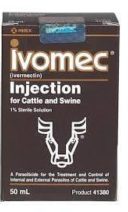
Ivermectin or Dectomax from Valley Vet or Tractor Supply
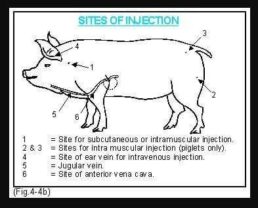
Give an injection behind the shadow of the ear in the soft fleshy spot
photo credit to the Pigsite.com
Farrowsure Gold is also something great to use before breeding season. Here is a link to Valley Vet to learn more about this: Valley Vet
What is the Farrowsure vaccine for pigs?
Farrowsure® GOLD and Farrowsure® GOLD B are approved for use in healthy breeding swine as an aid in preventing reproductive failure caused by porcine parvovirus (PPV); erysipelas caused by Erysipelothrix rhusiopathiae; and leptospirosis caused by Leptospira canicola, L. grippotyphosa, L. content credit to Valley Vet.
Vaccination Schedule
Always, check with your vet first before implementing any vaccination protocols as they can depend on the area in which you reside.
Piglet Age | What to do |
|---|---|
3-5 days of age | Iron injection |
10 - 14 days of age | Pneumonia vaccine if giving this vaccine, repeat in 2 weeks (usually given only in winter months) |
5 weeks of age | First dose of dewormer and first vaccination with Rhini Shield TX4 |
7 weeks of age | Pull DNA Hairs and Microchip, ear tag or tattoo |
7 weeks of age | Second Dose of Dewormer and Rhini Shield TX 4 |
7 weeks of age | Pull Mom to begin weaning process |
Feeding
KuneKunes must receive the proper nutrition and the proper amount of feed. While they are grazing animals they still need some grain.
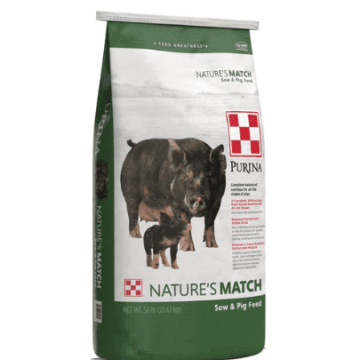
Purina Nature's Match available at Tractor Supply
Some breeders use this food
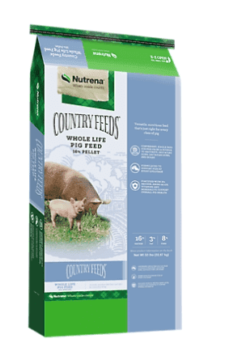
Nutrena Pig Food
Learn why to avoid this feed
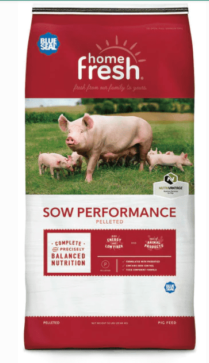
Blue Seal Sow Performance.
Learn why this is the feed of choice for most serious breeders.
Learn About Fencing
When I first started in KuneKunes, I was told to build the best possible fencing that you could afford. That certainly was great advice.
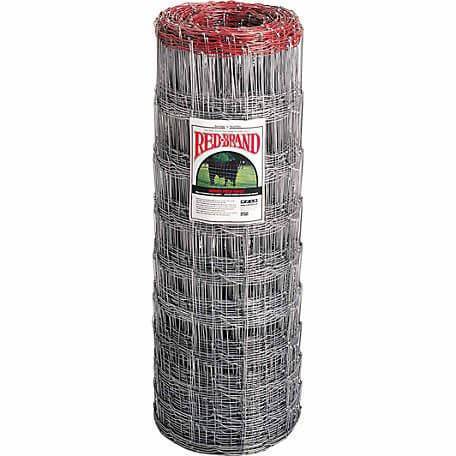
This is called field fencing and works great for older piglets and adult pigs. You can get this from Tractor Supply
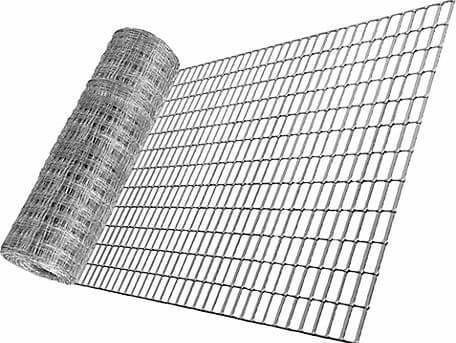
This is wonderful piglet fencing to use in your farrowing quarter areas and any area that will hold small piglets. That way they cannot go through it.
Alternative Fencing Options
Using Wooden Pallets
Our herd grew much bigger than we expected and obviously, extra fencing was needed. In talking with breeders one day, a gentleman gave me a piece of advice that I did not forget. He said, “Put up the best, strongest fence that you can afford”. Great advice!
Without a doubt, fencing can be expensive. Furthermore, not only do you need the fence, but the poles, insulators, etc. All of that adds up quickly when you are doing a vast area. I must give total credit to my husband, who produced fencing using pallets. They are strong and tough. It creates a very rustic look and it appealed to me, as we are surrounded by woods and are in the country.
(First of all, we put up our fencing in the fall, so please excuse the lack of paint which will be done in the spring. These pallets are painted with a barn red; I think they will look great.)
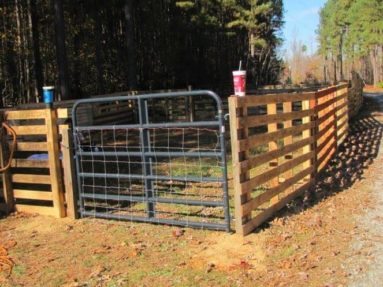
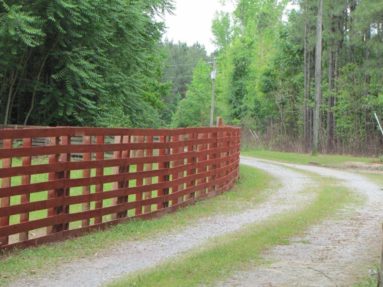
Noteworthy about fencing
KuneKunes are grazing animals, which means they need pastureland to feed on. However, they also enjoy foraging for acorns, plants, leaves and stems in the woods just like other grazing livestock. In addition to pastures, they also require shade. To provide both pasture and natural wooded sections within their fencing, the owners used trees as their posts and utilized the natural surroundings. For the fencing in the woods, they used shorter and less visually appealing pallets, while using better pallets in more visible areas.
To save money, the owners obtained free pallets from a building supply company that they used for fencing. However, they learned that when using chain link, they had to put it into the ground, or the kunes would get underneath it. For chain links or other types of fencing, using logs or wood nailed to the bottom and attached to the fence post works well to prevent the kunes from getting under it.
Water Dishes
These dishes are tough and durable. The one on the left is best for adult pigs and the one on the right is great for younger pigs. Don't be surprised to see them sitting in their water bowls. Having strong, tough bowls is essential to keeping them around for years to come. You can find these bowls at your local Tractor Supply.
They have so many to choose from. From 12 gallons to over 100 gallons. The pictures below are some of the most popular sizes. Tip: if you have pigs that like to dump their water bowls, try a kiddie pool or a children's sand box as they are not easily tipped over.
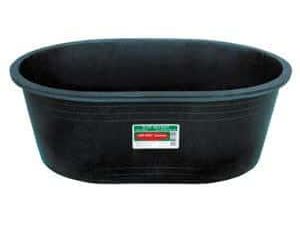
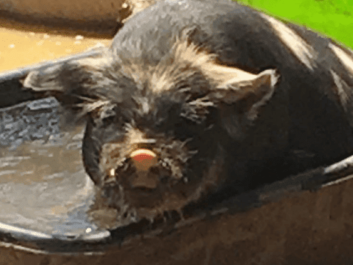
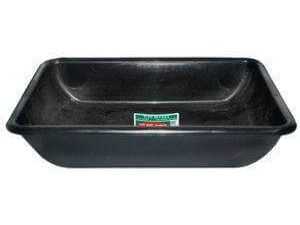
KuneKune Hoof Trimming
Be sure to check out a very comprehensive article about Mastering KuneKune Pig Hooves
for a detailed article about this topic. Digital images and videos to help you.
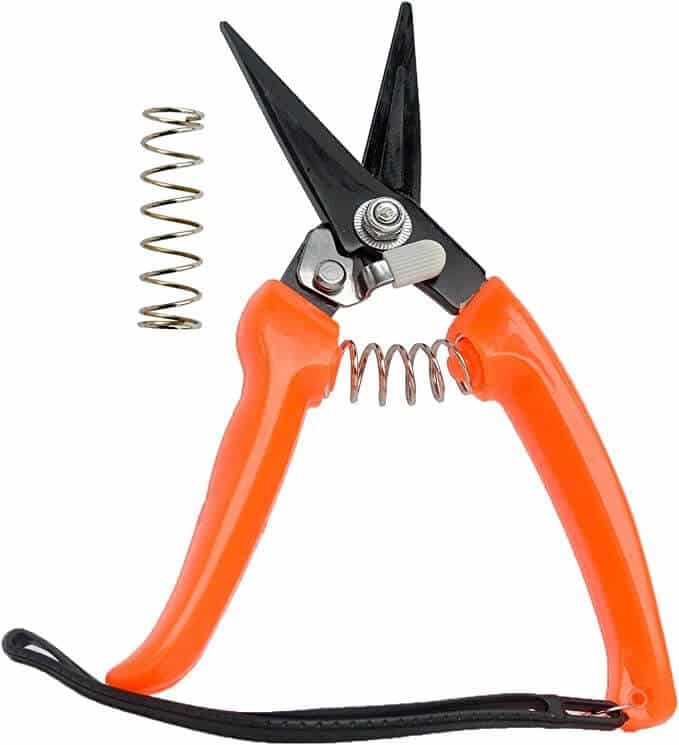
Can be purchased at Valley Vet or Amazon
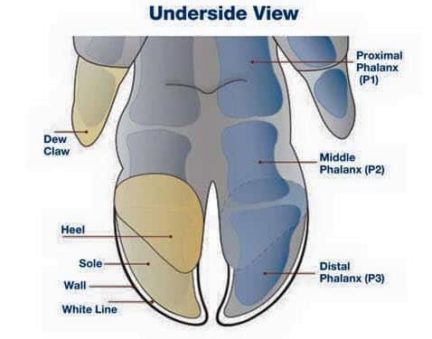
Tusk Trimming and Information about Pig's Teeth
To learn about pig teeth and tusks click the button
Housing
You can use Calf Huts and they are wonderful. Light and easy to move. I had to cut a small lip out of them for them to get in and out. Undoubtedly, I find these so much better than heavy wooden houses. Use carpet runners over the entrance during the wet or cold times of the year to provide a draft-free home for them.
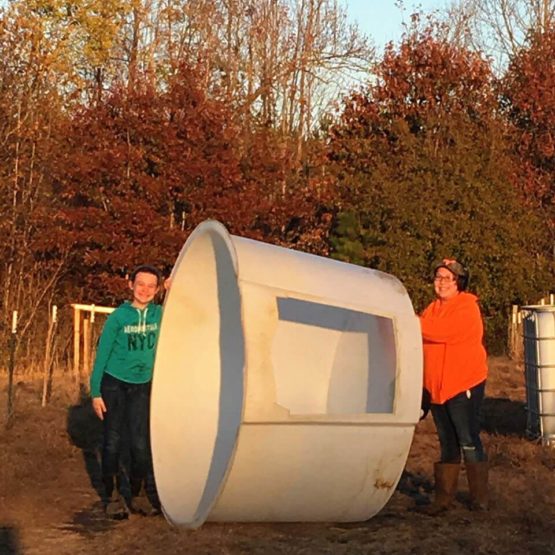
Undoubtedly the best option - just push it over and roll it wherever you want to go.
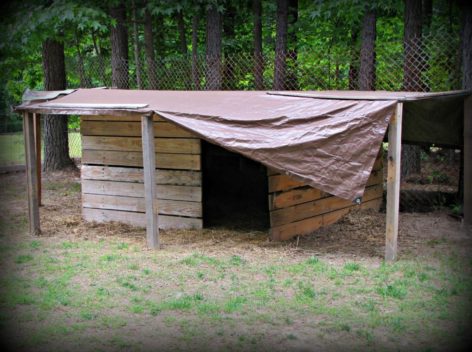
This is a wooden house built out of wooden pallets. It should be noted, that this is for the summer months. We put a porch on it for piglets to be able to get shade and we called this our summer house. We would block this off from use during the winter months.
How to Build A-Frame Pig Shelter article on Countryside written by Jodi Cronauer
Click here to Read
KuneKune Size Comparison
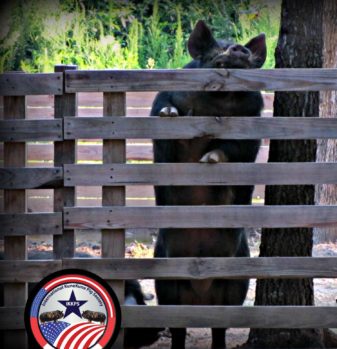
Are you a pig enthusiast or considering raising pigs for the first time? It's crucial to understand the different breeds and their size variations and why this breed is preferred by many pig farms. KuneKune pigs are a popular choice for small-scale pig farmers due to their docile nature, adaptability to various climates, and their ability to forage.
In this guide, we'll explore the size and how to pick the right breed for your farm. Whether you're a seasoned pig farmer or a beginner, this guide will provide you with valuable insights to help you make informed decisions and ensure the success of your pig-rearing venture.
Understanding the Different Breeds of Swine.
There are many breeds of swine out there. According to porkcheckoff.org, there are currently 8 major breeds of swine in the USA. They are the Berkshire, Chester White, Duroc, Hampshire, Landrace, Poland China, Spotted, and the Yorkshire. Currently, the KuneKune Pig is not among these breeds.
As we are the KuneKune Breed Registry we will not go into all the many aspects of the different breeds as a visit to Google will help you the most. Do your homework by visiting the various breed registries. Learn how big each breed gets and all their information about care, feeding, etc.
Visual Display of KuneKune Size Comparison
There is a very well-done visual display of the size variations. Done by Petpiggies. Here is a link to see the various breed sizes.
How KuneKune Size comparison to Commercial Breeds of swine.
KuneKune are smaller as compared to the commercial breeds. These pigs come up to your knee depending on how tall you are. They are fat, stout, and round. Usually, they weigh anywhere from 200 – 400 pounds. Of course, there are variations within the breed.
Choosing the Right Pig Breed for Your Farm.
When selecting the right pig breed for your farm, it's essential to consider your farming needs. If you're running a small-scale operation, KuneKunes may be the best feasible option. If you're running a large-scale operation, a large pig may be more suitable. It's also important to consider the space you have available for your pigs. Small pigs require less space than larger pigs and are ideal for farmers with limited space. This is one of the reasons KuneKune pigs are ideal for most farmers.
Another factor to consider when choosing this pig breed is their temperament. KuneKune pigs are known for their friendly and docile nature, but each pig has its personality.
It's essential to choose pigs that are comfortable around humans and other animals and are easy to handle. A friendly pig is easier to care for and can be a valuable addition to your farm.
Caring for KuneKune Pigs.
KuneKune pigs are a low-maintenance breed of pig, but they still require proper care to thrive. These pigs are adaptable to various climates and can live in both hot and cold environments. They are also excellent foragers and enjoy grazing on grass. This breed requires a balanced diet that includes a mixture of grains, vegetables, and fruits. It's also essential to provide them with clean water and a comfortable living environment.
KuneKune pigs are docile and friendly, but they still require socialization and exercise. These pigs enjoy spending time with humans and other animals and require daily interaction. They also require regular exercise to stay healthy and happy. Providing your pigs with ample space to roam and explore is essential to their well-being.
Common Health Issues of KuneKune Pigs.
KuneKune pigs are healthy, but like all animals, they can develop health issues. Some common health issues that pigs may experience include parasites, infections, and respiratory issues. It's essential to monitor your pigs' health regularly and seek veterinary care if you suspect they are sick. The best time to find a vet is before you have an issue. So, if you have not already acquired a vet, start now. Regular vaccinations and deworming can also help prevent health issues from developing. In most cases, you can easily vaccinate and deworm the pigs yourself.
In Conclusion
Understanding the various breed sizes and the different breeds is essential when selecting the right pigs for your farm. KuneKune pigs are a popular choice for small-scale farmers due to their docile nature, adaptability to various climates, and their ability to forage. By choosing the right breed and providing them with proper care, you can ensure the success of your pig-rearing venture.
How to Estimate the Weight of Your KuneKune in Pounds
Weight of your pig in POUNDS
~Obtain a fabric measuring tape or a piece of string to use as a measure. If using a string mark, the dimensions on the string and then measure the dimensions using a steel tape measure.
~Place the tape/string under the pig just behind the front legs and measure the circumference of the pig's girth in inches.
This measurement is known as the Heart Girth (see graphic)
~Then measure the length of the pig along its back from the base of its ears to the base of its tail, again in inches. (See graphic)
~To calculate the pig's weight, first square the Heart Girth to get the Girth Result.
~Now Multiply the Girth Result by the Length and DIVIDE by 400.
~You now have their weight in Pounds.
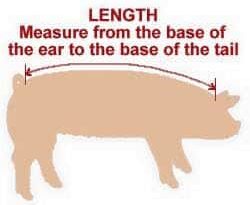
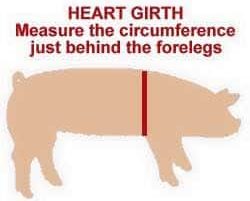
KuneKune Education
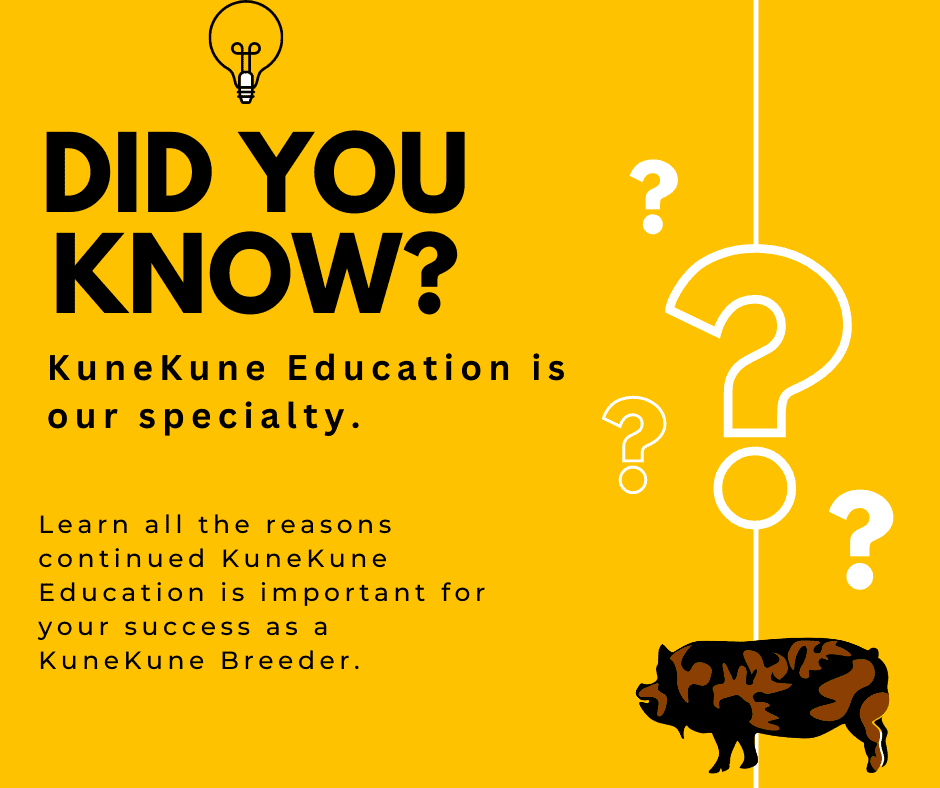
The Importance of KuneKune Education for Successful Pig Farming
KuneKune pigs are a popular choice for small-scale farming, but proper education is key to their care and management. Find out why KuneKune
Education is crucial for your pig farming success.
If you're considering raising KuneKune pigs on your small-scale farm, it's important to understand the unique needs and characteristics of these animals. Proper education can help you provide the best care and management for your pigs, leading to a successful and sustainable farming operation. IKKPS spends a vast amount of time doing articles, offering continuous learning opportunities, eBooks, and other creative ways to help with education.
Understanding the KuneKune breed and their unique needs.
KuneKune pigs are a unique breed that originated in New Zealand. They are known for their small size, docile temperament, and ability to thrive on pasture-based diets. However, they also have specific needs when it comes to housing, nutrition, and healthcare.
Proper education can help you understand these needs and provide the best possible care for your pigs. By learning more about proper care, you will have happy, healthy, KuneKune pigs and your breeding program will be better for it. If you visit our website there are pages dedicated to every aspect of taking care of this incredible breed.
Proper feeding and nutrition
KuneKune pigs have specific dietary requirements that differ from other pig breeds. Most people are more familiar with commercial hogs. How you care for them is different from how you care for a commercial swine.
They are known for their ability to thrive on pasture-based diets, but it’s important to ensure they are receiving the proper balance of nutrients. Likewise, since you hear this all the time, you would think that grazing only is enough. However, that is not true. So, while they are grazing animals, they do need other sources of nutrition. It is like eating cake every single day. So, it can help you survive, eventually, it will affect your health as you are not getting the other nutrients that you need.
KuneKune pigs require a diet that is high in fiber and low in protein, as well as always access to fresh water. They do well on a grain that is 16% and under. One of the best foods is Blue Seal. It is the Home Fresh line. Purine Nature’s match is also a good option that many breeders have used.
Unlike the commercial breeds where you will dump tons and tons of feed into them, this breed is very cost-effective only needing 2 cups (8 oz cups) of grain twice daily. It is better for them if you feed them twice a day. It’s important to work with a veterinarian or experienced KuneKune breeder to develop a feeding
plan that meets the specific needs of your pigs.
Health and disease prevention for KuneKune pigs.
Proper education about the health and disease prevention of KuneKune pigs is crucial for successful pig farming. Understanding the vaccinations and deworming protocol is vital to keep them healthy and safe from disease. Usually, your breeder will help to educate you on the protocols but never substitute that advice for the advice of a veterinarian. Usually, vaccinations are done twice a year and deworming is usually done twice a year.
KuneKune pigs are hardy and resistant to many common pig diseases, but they can still be susceptible to certain illnesses and parasites. Regular veterinary check-ups, proper sanitation, and preventative measures such as vaccinations and deworming are important for maintaining the health of your pigs.
It’s also important to monitor their behavior and appetite for any signs of illness or distress. Utilizing the feeding times twice, a day as an opportunity to do health inspections and to check on your pigs' well-being is also a key to success. It gives you a unique opportunity to pick up early any signs of illness by observing if they are enthusiastic about eating, how they are interacting with the other pigs, and how well they are moving.
Breeding and reproduction considerations
When it comes to breeding and reproduction, KuneKune pigs are prolific breeders and have great mothering skills. They typically have a smaller litter for their first litter with 2-6 piglets. After the first litter and depending on the bloodline they will normally have 4-8 piglets in a litter.
It’s important to carefully consider the genetics of your breeding stock, and their bloodlines and avoid inbreeding to maintain the health and vitality of your
herd. Additionally, proper nutrition and management during pregnancy and lactation are crucial for the health of both the mother and piglets. This is especially important, and we get into that more in our article on breeding and farrowing and in the Kunekune herd management video and article.
Socialization
KuneKune pigs are known for their friendly and docile nature, but socialization is still important for their well-being and safety. Spending time with your KuneKunes is important for several reasons. First, it will help the pig to learn to trust you. Second, it will help you learn about their unique temperament so that you can learn to trust the pig. As a result of this socialization between you and your pig, you will both trust each other while farrowing.
How your Registry Chose Can Make a Difference in your KuneKune Education needs.
IKKPS is different from other organizations and that is something we are immensely proud of. As mentioned above we spend a ton of time creating eBooks, articles, and continued learning opportunities. We are dedicated to preserving this amazing grazing pig for future generations and with that comes the commitment to offer KuneKune education. You cannot preserve without education.
As a result, most all our education materials are available to not only our members but publicly available to all who wish to learn more about this incredible breed of pigs we are so lucky to have called KuneKune pigs.
In conclusion
We have discussed how education is vital to your success as a KuneKune breeder and owner. Furthermore, we discussed more in-depth about feeding your pigs and educating yourself on the proper care, and housing requirements so that you can ensure you have a happy, healthy KuneKune pig. By using all the various forms of KuneKune education available, you are taking the right steps to ensure you are well-versed in all the many areas of care and herd handling.
Registry Office
17500 Hamilton Arms Court Dewitt, VA 23840
